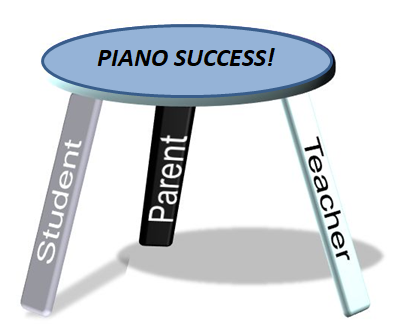How can I help my child practise piano?

Many parents say they don’t know how to help their child practise because they are not musical. While it might seem somewhat overwhelming; parental involvement is crucial to a child developing as a musician. The success of a musician is like a three legged stool, the process requires support from ALL three participants! Without three legs, the stool collapses. I am writing this blog entry to help clarify ways in which parents (even non musicians) can play their part in the process.
Firstly, young children will not be able to work through the process of learning an instrument with only input from the music tutor once a week. Like learning to read and write, most of the learning takes place away from time with the teacher.
Here are ten ways that parents can help their young musician.
1) Good habits
Good habits need to be formed. Get into the habit of assigning time to practise each day and put away all distractions such as phones, toys, TV and computers. Habits are formed through a cue, which is a signal to begin an action. For example, if you want your child to practise piano after school, the cue might be eating an afternoon snack which is immediately followed by piano practice. With young beginners, don’t expect more than 15 mins, as they mature the length of practise time can increase and it’s OK to incorporate comfort breaks during that time. Advanced students will eventually need to be managing 45 to 60 minutes a day in order to progress. When you see an outstanding performance from a young musician, it is not because they are super gifted, it really is down to regular, committed work, Luke warm effort a couple of times a week will not yield satisfying results.
2) Incentives
If you need a sticker chart or Lego stack to log practise done in order for a reward, please do it! I am not opposed to a little external motivation!
3) Be Present.
Younger children will need their parent around, in the same room. They will not ‘get on with it’ rather like when you had to help them learn to read or use a knife and fork or even clean their teeth – they need help. Learning piano is one of the most difficult skills to master Most children find this a difficult discipline and will require prompts and encouragement from Mum or Dad.
4) Teacher advice
I write in note books and on the pupils’ music regularly. This gives the young musician guidance of what to work on in the week ahead. Parents should check what I have written and simply remind the child of what I have said. If parents would basically remind their children what I have advised the pupil to do, this would be ENORMOUSLY helpful.
5) Rounded Musician
You will find that there are tasks set which involves technical work, including scales and arpeggios, sight reading and also pieces. Most pupils are also given music theory to complete each week and aural skills need to be worked on. The pupil needs to commit time to each area daily and not neglect aspects. Encourage them to do some work on each area every time they practise so that they develop all aspects of musicianship.
6) Scales & Arpeggios
Be aware of the scale chart and ask them how they are going.
- Show me which scales you play well.
- What’s important to remember when you play a scale?
- Which ones are the more tricky scales/arpeggios? Have you checked the key signature, fingerings and done slow work on it?
7) Sight Reading
Sight reading is a precious skill, if you child reads well, they can learn music more quickly and who doesn’t want to do that?! Children often forget to check the key signature, or to count and a bad habit is looking at their hands. Be there with a scarf or a tea towel to cover their hands! This means that their eyes will not leave the page and fluency improves!
8) Pieces
Some pieces will be set that should only take a week or two to learn, this means that the student is seeing different music regularly (not relying on memory) and therefore improving the repertoire and their ability to sight read. Other pieces are more challenging and will need 4 to 8 weeks to play securely. Please ask me which pieces are short term goals and which ones are more challenging. I often send links of recordings to help both parent and child listen to good examples of how their pieces should be performed. I often
You should NOT hear pupils simply playing through a piece start to finish, with lots of errors. This is NOT practise and it forms very bad habits. Ingrained mistakes are extremely difficult to undo and it becomes frustrating for the child. Ask them?
- Which piece has some bars that need work?
- Try that section again and do slow practise, hand separately so that it is accurate seven times in a row.
**Seven times correctly might sound a lot but if this is only a few bars of music, sometimes even just one bar, it is not onerous**
Making a video recording of your child playing and watching it back together also helps the child to see what needs improving. You won’t even need to say anything because they can assess themselves and diagnose their own problems.
9) Listening and enjoying piano music
Listen to piano music, go to concerts – this sparks imagination and motivation. Listening to music is equally important to playing music. What does your child like playing or listening to? Ask them what their best piece is and why. Play music around the home, especially recordings of the pieces they are learning and going to see live music is often very inspiring. Creating a musical life and home helps them develop has a powerful impact on motivation and awareness.
10) Talk, praise and Encouragement
Talk to the child so that they know you are interested and that you understand what is difficult. Ask questions about what they have learned in their lessons today. Also ask them to show you what they are playing. Talking about their piano playing also encourages them to use musical vocabulary and to think about their learning. Celebrate your child’s successes and acknowledge their commitment, concentration and achievements . If your child gives and impromptu performance, stop and listen and talk proudly about how his/her hard work has paid off. Praise your child for a good posture, nice curved fingers, counting, playing a scale evenly, improved attention span and talk about their effort and determination in mastering something that was difficult. Ask your budding musician to put on a little performance. At Christmas ask them to play carols for you all, or play Happy Birthday for a celebration!
In conclusion: Learning the piano is not easy but it is certainly possible for anyone who is willing to put the time into regular and effective practise. As with anything that is difficult, children go through times of wanting to give up but until they are mature and mentally resilient enough to manage these challenges, it is up to you, the parent, to encourage and guide them.
Julie Csorba 15/12/2023

